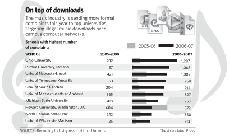Students targeted for sharing music files

The Associated Press
Feb 22, 2007
Last updated on May 12, 2016 at 08:14 a.m.
WASHINGTON – College students who faced lawsuits for illegally sharing large music collections over campus computer networks increasingly risk being unplugged from the Internet or even suspended over lesser complaints by the recording industry.
In a nationwide crackdown, the music industry is sending thousands more copyright complaints to universities this school year than last. In some cases, students are targeted for allegedly sharing a single mp3 file online.
A few schools – Ohio University and Purdue University are at the top of the list – already have received more than 1,000 complaints accusing individual students since last fall. For students who are caught, punishments can vary from e-mail warnings to semester-long suspensions from classes.
“When they told me I freaked,” said Ryan Real of Louisville, an Ohio University sophomore who was accused in November of illegally sharing not music but a popular video game, “Grand Theft Auto,” over the school’s network. Real said he was ordered to delete the game and the Bittorrent file-sharing software he was using from his computer before the school would turn his Internet connection back on.
Get The Daily Illini in your inbox!
“Everybody does it,” Real said. “The odds that you are going to get caught, it’s not something you think about.” Classmates who also have been caught “still download illegally,” Real said.
At the request of The Associated Press, the trade group for the largest music labels, the Recording Industry Association of America, identified the 25 universities to which it has sent the most copyright complaints so far this school year.
The group, which has long pressured schools to act more aggressively, said software tools are improving to trace illegal file-sharing on campuses.
“We are taking advantage of that technology to make universities aware of the problem on their campuses,” said RIAA President Cary Sherman. “They need to be sending a message to their students about how to live a lawful life.”
The top five schools are Ohio, Purdue, the University of Nebraska-Lincoln, University of Tennessee and the University of South Carolina. The RIAA complained about almost 15,000 students at the 25 universities, nearly triple the number for the previous school year.
Under federal law, universities that receive complaints about students illegally distributing copyrighted songs generally must act to stop repeat offenders or else the schools can be sued. The entertainment industry typically can identify a student only by his or her numerical Internet address and must rely on the school to correlate that information with its own records to trace a person’s identity.





